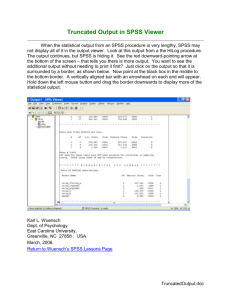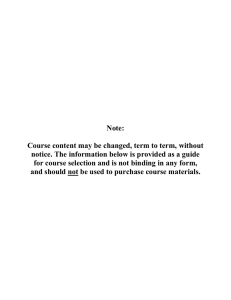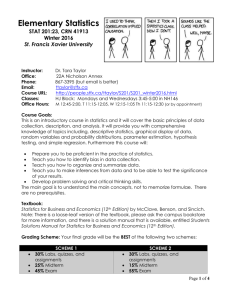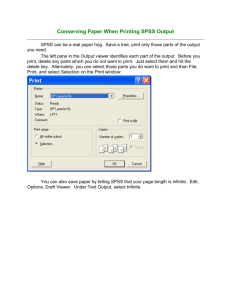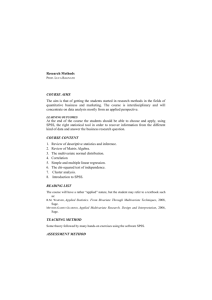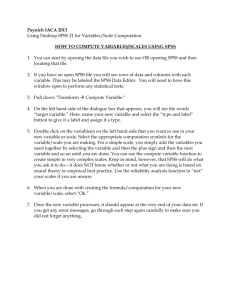Note: Course content may be changed, term to term
advertisement
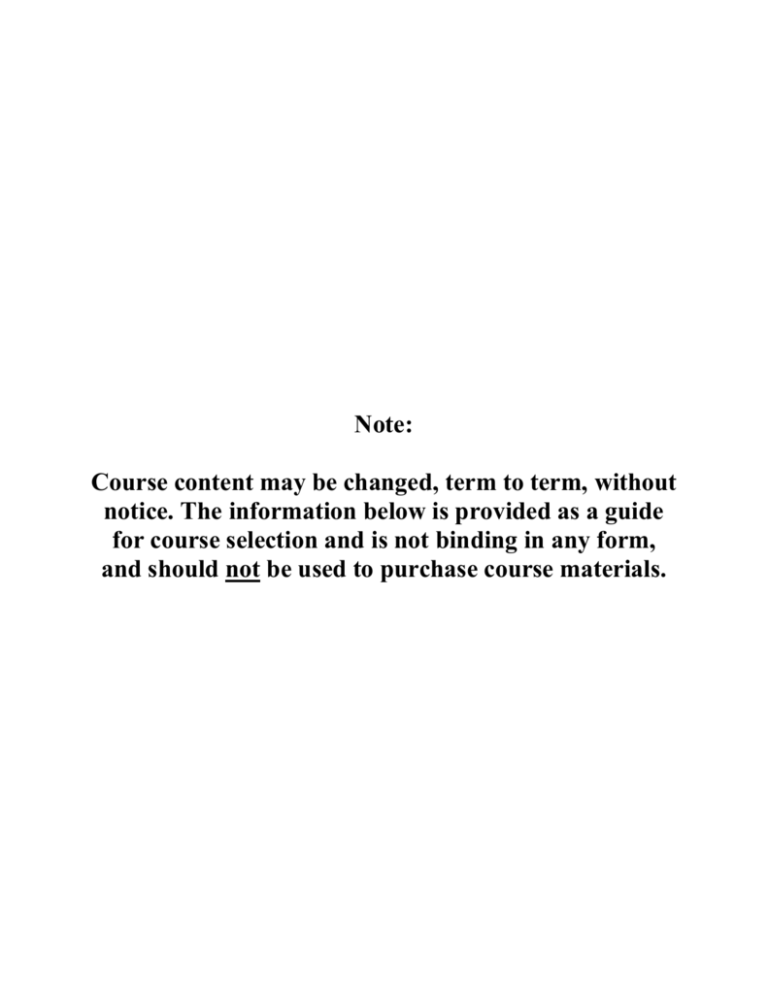
Note: Course content may be changed, term to term, without notice. The information below is provided as a guide for course selection and is not binding in any form, and should not be used to purchase course materials. COURSE SYLLABUS EDUC 712 ADVANCED EDUCATIONAL STATISTICS COURSE DESCRIPTION This course involves an examination of descriptive statistics and basic inferential statistical techniques. Hypothesis testing, confidence intervals, analysis of variance, correlation techniques and nonparametric statistical methods will be discussed. RATIONALE This course is designed to help educators gain a basic understanding of the nature of educational statistics. At the conclusion, candidates should be able to apply what they have learned in actual practice in a God-centered manner. I. PREREQUISITES EDUC 518 or equivalent course in educational research II. REQUIRED RESOURCE PURCHASES Click on the following link to view the required resource for the term in which you are registered: http://bookstore.mbsdirect.net/liberty.htm III. RECOMMENDED RESOURCE PURCHASE Morgan, S. E., Reichert, T., & Harrison, T. R. (2002). From numbers to words: Reporting statistical results for the social sciences. Boston: Allyn & Bacon. ISBN: 080133280X. IV. ADDITIONAL MATERIALS FOR LEARNING A. Computer with basic audio/video output equipment B. Internet access (broadband recommended) C. Microsoft Office (Microsoft Office is available at a special discount to Liberty University students.) D. Software Downloads (Silverlight, Adobe PDF Reader, and Flash Player are available to the candidate through the Services/Support link on the Course Menu in Blackboard) E. iTunesU (Optional) F. Mills, Max G. & Pantana, John J. (2006). All the right clicks. Forest, VA: Chart the Course text. This is recommended, but not required. Page 1 of 4 EDUC 712 Syllabus V. MEASURABLE LEARNING OUTCOMES Upon successful completion of this course, the candidate will be able to: VI. A. Define various approaches to faith and learning integration. B. Explain basic research designs and research terms. C. Define basic statistical terms including normal and non-normal distributions of data, measures of central tendency (i.e. mean, median, and mode), variability (i.e. range, variances, standard deviations, and the standard error of the mean), levels of measurement, and probability (e.g. alpha level, p). D. Explain the role that levels of measurement play in selecting appropriate statistical procedures. E. Use SPSS to calculate and interpret descriptive statistics, z scores, T scores, and percentiles. F. Describe statistical hypothesis testing, including rejecting and failing to reject the null hypothesis, and define Type I and Type II errors in statistical decisionmaking. G. Define the power of a statistical procedure and how power is maximized. H. Describe assumption testing and when it is appropriate to choose parametric verses nonparametric statistics and choose appropriate statistical procedure to an educational solve research problems. I. Describe the logic of selected statistical procedures. J. Use SPSS to explore data and solve statistical problems and communicate statistical results in accordance with APA style. COURSE REQUIREMENTS AND ASSIGNMENTS (details in Assignment Instructions) A. Textbook Readings and Lecture Presentations The candidate will complete assigned readings from course texts and view corresponding instructor material including presentations, tutorials, and notes. B. Course Requirements Checklist As the first activity in this course, please read the syllabus and Student Expectations. After reading the syllabus and Student Expectations, the student will then complete the related checklist found in Module/Week 1. C. Discussion Board Forums (5) The candidate will complete each Discussion Board forum in two parts: 1) the posting of an original thread in response to the stated prompt, and 2) the posting of at least two replies to peers’ original threads. The original thread is due by Wednesday of the pertinent module/week, and the replies are due by the last day of the pertinent module/week. All writing should be in APA format Page 2 of 4 EDUC 712 Syllabus D. SPSS Assignments (4) The candidate will use the SPSS tool to complete assignments based on the specific data sets provided. Using the SPSS data set, the candidate will run the statistical procedure, analyze the data, and report the results in a properly formatted APA Results section. Each SPSS Assignment is due by the end of the pertinent module/week. E. Quizzes (16) The candidate will take four open-book and open-notes quizzes covering the assigned Howell (2011) textbook readings. Each quiz will consist of 10 multiplechoice questions. Although the quizzes are graded, they are treated primarily as a study tool and may be completed as many times as the candidate desires. F. Final Exam After completing the textbook readings, viewing the lecture presentations, and completing course assignments, the candidate will complete a two-part final exam. The first part of the exam is an objective test consisting of 50 multiplechoice questions covering all of the assigned readings from the Howell (2011) text. The second part of the exam is an SPSS assignment similar to the other assignments completed in this course. Each portion of the exam will be graded separately. VII. COURSE GRADING AND POLICIES A. Points Course Requirements Checklist Discussion Board Forums (5 at 50 pts ea) SPSS Assignments (4 at 70 pts ea) Quizzes (16 at 10 pts ea) Final Exam Objective Test SPSS Assignment Total B. 10 250 280 160 150 160 1010 Scale A = 960–1010 A- = 940–959 B+ = 920–939 B = 890–919 B- = 870–889 C+ = 850–869 C = 820–849 C- = 800–819 D+ = 780–799 D = 750–779 D- = 730–749 F = 729 and below C. Late Assignment Policy: The nature of this course requires that the candidate interact with the material, professor and other students on a weekly basis. Because of this, it is difficult to achieve the fullest experience in this learning environment when assignments are late. If unable to complete an assignment on time, the candidate must contact the instructor immediately by email to make arrangements for the completion of that assignment. Page 3 of 4 EDUC 712 Syllabus Assignments that are submitted after the due date without appropriate excuse and preapproval will receive the following deductions: • Assignments submitted after the due date will receive a 10% deduction. • Assignments submitted more than one week late receives a 20% deduction. • Assignments submitted after two weeks late or after the final due date of the class will not be accepted without documentation or extenuating circumstances. D. Plagiarism Policy Plagiarism is prohibited. Please see the APA manual for information about plagiarism and how it is defined. Additionally, academic misconduct includes not only plagiarism, but also academic dishonesty falsification. See The Liberty Way for specific definitions, penalties, and the processes of reporting. E. Professional Writing Policy The candidate is expected to demonstrate professionalism in all writing assignments. Assignments that display poor writing and numerous APA, spelling, and/or grammar errors will be required to be rewritten or will result in a zero at the instructor’s discretion. F. Email Policy The course instructor will only email the candidate using the candidate’s university email address; therefore, the candidate is responsible for regularly checking his/her university email. Additionally, when sending e-mail to the instructor, the candidate should label it in the following manner: Course, last name, first name. G. Disability Assistance Teacher candidates with a documented disability may contact Liberty University Online’s Office of Disability Academic Support (ODAS) at LUOODAS@liberty.edu to make arrangements for academic accommodations. Further information can be found at www.liberty.edu/disabilitysupport. Page 4 of 4 COURSE SCHEDULE EDUC 712 Textbooks: Green & Salkind, Using SPSS for Windows and Macintosh (2010). Howell, Fundamental Statistics for the Behavioral Sciences (2011). Morgan et al., From Numbers to Words: Reporting Statistical Results for the Social Sciences (2002). APA, Publication manual of the American Psychological Association. WEEK/ MODULE READING & STUDY 1 APA: chs. 3–5 2 presentations 1 website Online Statistics Guide ASSIGNMENTS POINTS Course Requirements Checklist Background Check Quiz Discussion Board Forum 1 10 0 0 0 50 2 Green & Salkind: units 1–5 Howell: chs. 1–6 Morgan: chs. 1–3 2 presentations Online Statistics Guide readings SPSS Descriptive Statistics Assignment CYU Quizzes, chs. 1–6 70 60 3 Howell: chs. 7–8 & 12–15 1 presentation Online Statistics Guide readings Discussion Board Forum 2 CYU Quizzes, chs. 7–8, 12–15 50 60 4 Green & Salkind: lessons 22–24 Morgan: pp. 54–55 2 presentations Online Statistics Guide readings SPSS t Test Assignment 70 5 Howell: chs. 9–10 1 presentation Online Statistics Guide readings Discussion Board Forum 3 CYU Quizzes, chs. 9–10 50 20 6 Green & Salkind: lessons 30–32 Morgan: pp. 31–34 3 presentations Online Statistics Guide readings SPSS Correlation & Regression Assignment 70 7 Green & Salkind: lessons 25–26 & 29–30 Howell: chs. 16 & 18 Morgan: ANOVA, pp. 55–63 3 presentations Online Statistics Guide readings Discussion Board Forum 4 SPSS ANOVA Assignment CYU Quizzes, chs. 16 & 18 50 70 20 8 Review Discussion Board Forum 5 Final Exam: Objective Test Final Exam: SPSS Assignment 50 150 160 TOTAL 1010 Ed.D Advising Guide Quiz Ed.S Advising Guide Quiz CYU = Check Your Understanding NOTE: Each course week begins on Monday morning at 12:00 a.m. (ET) and ends on Sunday night at 11:59 p.m. (ET). The final week ends at 11:59 p.m. (ET) on Friday.



